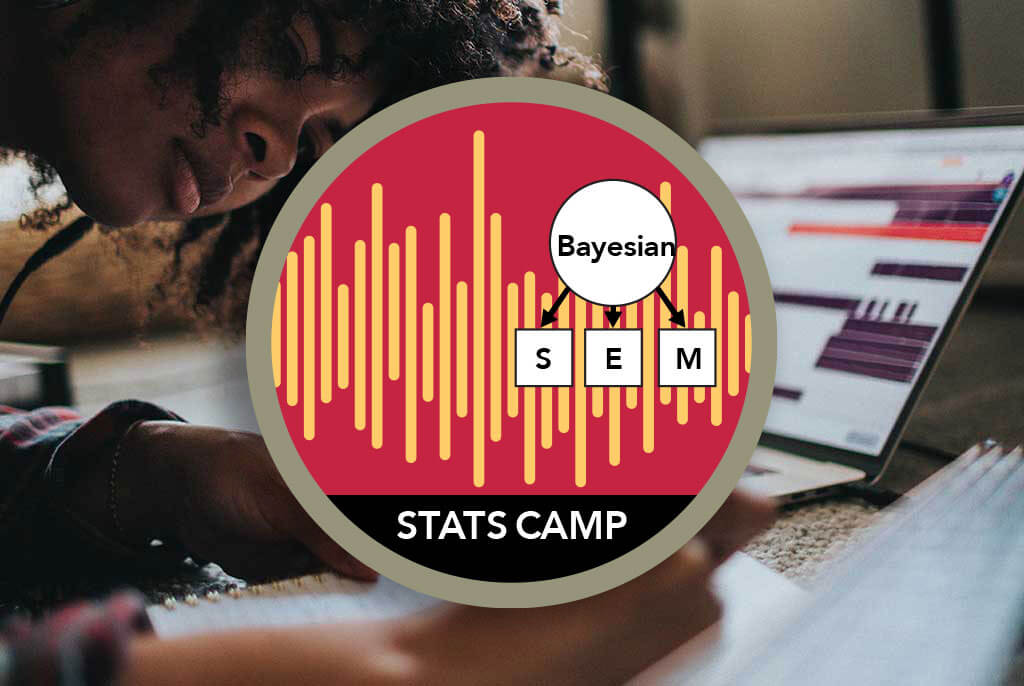Sponsorship Opportunity:
Apply for $1150 scholarship and learn Bayesian SEM at Stats Camp. Instructor Mauricio Garnier Villarreal got awarded (co-PI) the grant “Scaling Bayesian Latent Variable Models to Big Education Data” from the United States Department of Education. We are able to sponsored 2 students with $1150 each for the registration to the Bayesian SEM course.
Please email the following information to the instructor at mgv@pm.me
LIVE STREAM – 4-day Statistics Short Course
Seminar Overview:
The goal of the Bayesian SEM is to provide instruction in the application SEM from the Bayesian paradigm. It will cover the application of models commonly implemented in frequentist SEM, and in models that are complicate or impossible to estimate in the frequentist paradigm. This seminar is design to portray the advantages of the Bayesian paradigm, both philosophical and practical, within the application of SEM. The material and examples will be provided in the open source platform R, but if the students prefer to work with another program we will assist in the understanding and application. In addition, students who sign up for this seminar can request topics to be included during the weeklong seminar. If we have the expertise, we’ll gladly prepare and deliver a module on the topic! As with all Stats Camp seminars, personal consultation time is available and ample support resources are provided on our web pages at statscamp.org.
A perfect follow up for SEM Foundations or Bayesian Data Analysis!
Seminar Topics:
- Bayesian inference
- MCMC estimation algorithm
- Prior selection
- Model comparison
- Commomly applied SEM models: CFA, SEM, multiple group, grorth curve
Seminar Description:
You have a good to great understanding of structural equation modeling (SEM), maybe you have been doing traditional SEM for years, but you’ve began a project where your observations are not normally distributed, you have a small sample size, or even worse – your model is not converging! What do you do now? Bayesian SEM is your next step!
Advanced SEM: Bayesian SEM will cover models that may be too complicated or impossible to estimate in the traditional SEM framework. This seminar highlights the philosophical and practical advantages of the Bayesian approach to SEM.
Instructors: Mauricio Garnier-Villarreal, Ph.D.

Mauricio is a full time assistant professor at Vrije Universiteit Amsterdam. His Ph.D focused on Quantitative Psychology at the University of Kansas completed in the summer of 2016. His research focus is …on the application of Bayesian methods to complex structure data for longitudinal analysis, from both mixed-effects and SEM models. He has experience not only working in the test and development of methods, but also in the application of these in data; in different fields like special education, cognitive decline in aging, healthy aging (orcid.org/0000-0002-2951-6647). He has been involved in the Stats Camp since 2011.
Esteban Montenegro, Ph.D.

I’m a researcher at the UC Davis Alzheimer’s Disease Center- East Bay. I conduct data analysis using advanced statistical methods such as latent variable modeling. I have 6 years of experience programming in R, and I love learning about Linux and statistical new tools.…I’m always open to new projects and ideas, I collaborate with several teams around the world on topics related to healthy aging, Alzheimer Disease and other health related topics.
APA Continuing Education Credits:
Please contact us for exact # of credit hours for continuing education credits. Stats Camp Foundation is approved by the American Psychological Association to sponsor continuing education for psychologists. Stats Camp Foundation maintains responsibility for this program and its content.
Seminar Includes:
Materials, downloads, recorded course video viewable for up to one year.



